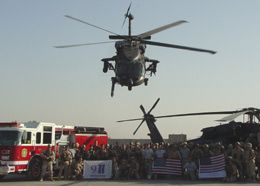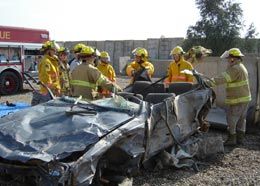| Editor’s note: In the final article of a two-part series on the role U.S. fire personnel are playing in Iraq, FireRescue1 looks at those working side by side with the military. |
By Jamie Thompson
FireRescue1 News Editor
 Photo WSI Firefighters line up with military personnel at a base in Iraq last year. |
There are few environments more hostile to work in than Iraq.
But since the start of the war, thousands of U.S. firefighters have opted to be based at military sites there.
Their roles range from giving fire prevention classes to military officers to fire suppression on the bases.
Kristian Kluzinski, manager for planning and integration in Iraq for Florida-based security services organization Wackenhut Services Inc., said the company currently has about 630 contracted firefighters working in Iraq. The year-long contracts offered by WSI start at about $90,000.
Kluzinski said firefighters have three main reasons for going to Iraq: money, patriotism and the chance to gain more firefighting experience, which can be invaluable for volunteers.
“A lot of them want to do the job full-time in the United States, but can’t get into a department,” Kluzinski said. “Going to Iraq gives them the opportunity to get that full-time experience and we also offer them training classes while they are they are there so they can get certifications in various areas.”
However, the exodus of firefighters to work in Iraq has had repercussions for fire departments back home.
At the end of last year, it was reported that more than one-fifth of firefighters at Rocky Mount Fire Department in North Carolina were working in Iraq.
Acting Fire Chief Keith Harris told the Wilmington Star-News that 17 of the city’s crew members had resigned in the previous 21 months to take jobs as contract firefighters at military bases in Iraq for WSI.
He labeled it the “Iraq phenomenon,” but added that he couldn’t blame firefighters for heading there because of the financial incentives and educational opportunities available to them.
Dominic Leuci, a 25-year-old volunteer firefighter from North Carolina who spent a year in the war-torn country in 2005, was enticed by the opportunity of working alongside the military. His boyhood dream was to serve in the military, but a degenerative disc disease in his spine had made that impossible.
“Not only did this give me the best opportunity to work closely with the military, which I couldn’t otherwise do, but it also good financially,” Leuci said.
Leuci had been a member of the Hopkins Fire Department for about four years before going to Iraq. He had looked into becoming a paid firefighter, but couldn’t pursue it further due to financial constraints.
Now, about a year after getting back from Iraq, he has interviews with three departments lined up in the coming weeks.
 Photo Dominic Leuci U.S. firefighters undergo training at the Kalsu base in Iraq in 2005. |
“Because of what I learned in Iraq, I’ll be able to bring a lot of stuff to the job,” Leuci said.
“Because everything is on small scale there, it gives you the chance to do lots of different things. I was able to do things from SOPs to personnel tracking.”
Electrical fires
The job is not as dangerous as one might imagine, said Kluzinski, as the incidents tackled by firefighters on the military bases are on-site. The majority are structural, but also include crash rescue responses and electrical fires.
“Despite being in a combat zone, it is relatively safe; they’re not performing any duties off of the US military bases,” Kluzinski said. “But the job they do as a firefighter obviously has its inherent dangers, the same as they’d find in the States.”
One obvious challenge posed to firefighters is the heat, making hydration even more important than usual. Another major issue is vehicle and equipment maintenance, according to one firefighter who worked in Iraq.
“You had to stay on top of all of it,” said the firefighter, who asked not to be named. “If an apparatus went down then the work schedule had to be adjusted. We couldn’t get parts quickly — it might take a couple days or six months or more to get the part and the apparatus back in service.”
Despite the heat and apparatus problems, Leuci said his experience was worthwhile, both professionally and personally.
“Besides learning about the equipment, being in a situation like that, you learn a lot about life,” he said, “and you develop a greater understanding and respect for the military.”
- For more details on working in Iraq for WSI, e-mail Kristian Kluzinski at kkluzinski@wsihq.com

